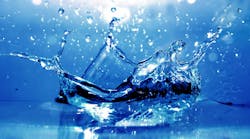by James Laughlin, Editor
The Bush Administration has voiced support for a new (or at least renamed) tool for water funding - Water Enterprise Bonds. The goal is to increase investment in the nation’s water infrastructure through the use of private activity bonds (PABs). The proposal calls for exempting PABs issued to finance public-purpose drinking water and wastewater facilities from state volume caps.
This was just one of the topics discussed during the recent conference “Paying for Sustainable Water Infrastructure.” The EPA -sponsored event brought together a cross-section of the water industry to discuss, debate, and brainstorm approaches to reducing costs and increasing investment in drinking water and wastewater systems.
Public utilities are offered a special tax status under the Internal Revenue Code that allows them to raise funds through state and local bonds without paying taxes on the interest. This effectively gives them a lower interest rate than is available to private, profit-making entities. Some public-private programs are already offered tax exemption from bond financing under the PAB program, but there is a cap on the number of these private activity bonds.
Eliminating the cap for water projects would allow more private corporations to obtain tax exempt loans to finance, build and manage public water facilities in cooperation with communities.
“This proposal, if enacted, would lead to a more robust market offering of new solutions to our water infrastructure investment challenges,” EPA Assistant Administrator for Water, Ben Grumbles, said during his presentation at the conference.
A bill to remove the PAB cap was introduced in the US House in 2005, HR 1708, but that measure died when its sponsor failed to win re-election last fall. Currently there is no pending vehicle in the House or Senate that would allow for removal of the PAB cap. Removing the cap would require a change in tax code, which would be an up-hill battle even with the Administration’s support.
Attendees at the conference were in general agreement that paying for water infrastructure will require creative thinking, innovative financing and a mix of local, state, and federal funds. Without a doubt, user fees will be the primary funding mechanism.
A variety of alternative revenue mechanisms, federal programs, and various user fees were discussed at the forum. The challenges faced by cities attempting full-cost pricing also were discussed.
Presentations from the Paying for Sustainable Water Infrastructure Conference are available at http://www.payingforwater.com/presentations. EPA plans to update the conference website with information and resources on paying for sustainable water infrastructure with the goal of using the website to continue the dialogue that was started at the conference.
On a similar vein, EPA’s Local Government Advisory Committee (LGAC) has developed a DVD that highlights how local governments are addressing aging sewer and water systems to meet current and future challenges facing their communities. The DVD profiles five real communities and demonstrates how they are meeting the daily needs for repair or replacement of aging systems, coping with population growth, addressing issues related to environmental health, and water security demands. The DVD presents some innovative options to ensure water quality in the future. Visit www.epa.gov/waterinfrastructure/lgac_video/index.html.


